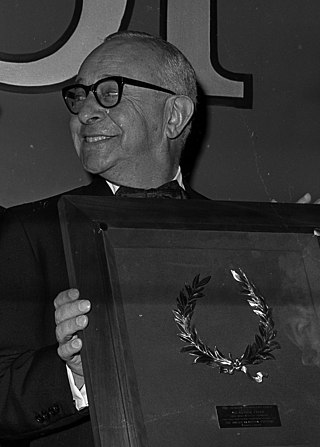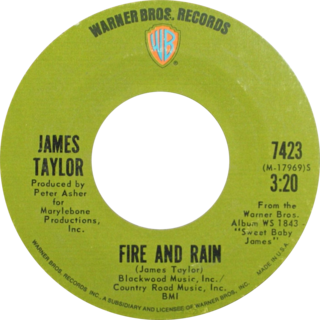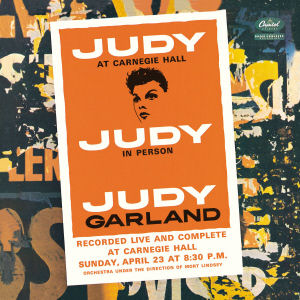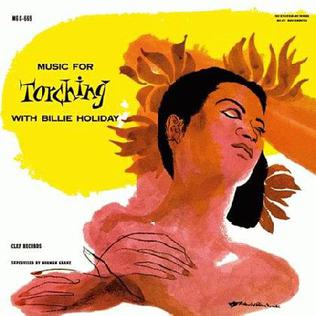Related Research Articles

Arthur Freed was an American lyricist and a Hollywood film producer. He won the Academy Award for Best Picture twice, in 1951 for An American in Paris and in 1958 for Gigi. Both films were musicals, and both were directed by Vincente Minnelli. In addition, he produced the film Singin' in the Rain, the soundtrack for which primarily consisted of songs he co-wrote earlier in his career.

Harold Arlen was an American composer of popular music, who composed over 500 songs, a number of which have become known worldwide. In addition to composing the songs for the 1939 film The Wizard of Oz, including "Over the Rainbow", which won him the Oscar for Best Original Song, he was nominated as composer for 8 other Oscar awards. Arlen is a highly regarded contributor to the Great American Songbook. "Over the Rainbow" was voted the 20th century's No. 1 song by the RIAA and the NEA.

"Fire and Rain" is a song written and performed by American singer-songwriter James Taylor, released in August 1970 by Warner Bros. Records as the second single from Taylor's second studio album, Sweet Baby James. The song follows Taylor's reaction to the suicide of Suzanne Schnerr, a childhood friend, and his experiences with drug addiction and fame. After its release, "Fire and Rain" peaked at number two on RPM's Canada Top Singles chart and at number three on the Billboard Hot 100.

Portrait in Jazz is the fifth studio album by American jazz pianist Bill Evans as a leader, released in 1960. It is the first of only two studio albums to be recorded with his famous trio featuring bassist Scott LaFaro and drummer Paul Motian.
Berri is an English singer, best known for her 1995 hit single, "The Sunshine After the Rain", which was originally recorded by Ellie Greenwich in 1968 and later was a hit for Elkie Brooks, reaching number 10 in 1977.
Billy Livsey is an American songwriter, keyboardist, and producer originally from St. Louis, Missouri and now resides in Nashville, Tennessee. He has worked with many musicians including Tina Turner, Kevin Ayers, Phil Manzanera, 801, Gerry Rafferty, Five Star, Gallagher and Lyle, Ronnie Lane, Kenny Rogers, and Rodney Crowell. Livsey played the keyboard solo on Tina Turner's "What's Love Got to Do with It", and keyboards on "Breakaway" and "Heart on My Sleeve" for Gallagher and Lyle, and on "How Come" for Ronnie Lane. Livsey founded his own publishing company called Quince Music Ltd. in the 1980s, and more recently, Billy Livsey Music, both of which are still active today.

Art Blakey and the Jazz Messengers, also called Moanin', is a studio album by Art Blakey and the Jazz Messengers recorded on October 30, 1958 and released on Blue Note later that year.

Judy at Carnegie Hall is a double-LP live recording of a concert by Judy Garland at Carnegie Hall in New York, with backing orchestra led by Mort Lindsey. This concert appearance, on the night of Sunday April 23, 1961, has been called "the greatest night in show business history".

Saturday Night with Mr. C was Perry Como's third RCA Victor 12" long-play album, and his first recorded in stereophonic sound. The album is structured as an extended version of the request section of his popular television show, beginning and ending with his theme songs "Dream Along With Me" and "You Are Never Far Away" and with his TV request theme, "We Get Letters" used twice in the album as an intro. At the time, Perry was seen on NBC's Saturday night schedule at 8 P.M. Eastern Time.

Temperature Rising is the second English language album by Thai singer Tata Young. It was released in 2006. The album consists of cover songs and original songs. The first single is "El Nin-YO!", from the lyrics of which the album's title comes.. Her second single is "Zoom" which was released in September.

The Last Trane is an album credited to jazz musician John Coltrane, released in 1966 on Prestige Records, catalogue 7378.

"My Mammy" is an American popular song with music by Walter Donaldson and lyrics by Joe Young and Sam M. Lewis.
"Indian Summer" is an American standard originally written as a piano piece by the prolific composer Victor Herbert. Al Dubin wrote lyrics for the tune in 1939, twenty years after Herbert wrote the tune.

Oscar Peterson Plays the Harold Arlen Songbook is an album by Canadian jazz pianist Oscar Peterson, which was recorded in 1959. It was reissued in 2001 combined with the 1954 recording Oscar Peterson Plays Harold Arlen.

New Feelin' is Liza Minnelli's sixth album, released in the United States on October 19, 1970. It was her third and last studio album with A&M Records; Minnelli's fourth and final release on the label is her live album Live at the Olympia in Paris, released two years later in 1972. New Feelin' sees Minnelli following a new formula of mixing old songs with contemporary production.

Music for Torching is a studio album by jazz singer Billie Holiday. A collection of torch songs, it was released in 1955 by Clef Records. It is her first 12-inch LP for the label, after four 10 inch LPs.

Down Home is the third album by the double bass player and cellist Sam Jones, recorded in 1962 and released on the Riverside label.

Øyvind Brække is a Norwegian jazz musician (trombone), composer, music arranger and band leader, best known for Bodega Band and S. Møller Storband. He was the initiator of the popular and still active band The Source, who released several albums, and made contributions to dozens of recordings with musicians like Chick Corea, Eirik Hegdal, Per Zanussi, Erlend Skomsvoll, Trondheim Jazz Orchestra, Knut Kristiansen, Jacob Young, Trygve Seim, Per Oddvar Johansen, Mathilde Grooss Viddal, Dingobats, Sverre Gjørvad, Motorpsycho, FriEnsemblet and Come Shine.

Solo John/Solo Scott is a split-EP by John Walker and Scott Walker, members of the American pop group The Walker Brothers. It was released in 1966 and reached number four on the UK EP Chart. While the EP is made up of solo recordings, it is officially considered part of the Walker Brothers group discography.

Yesterday Is Now is the debut studio album by Australian singer David Campbell. The album was released in February 1997 by Polydor Records. The album includes the studio recording of "Heaven Knows" from Only Heaven Knows for which he was nominated for Best Musical Theatre Performer at the 1995 Mo Awards.
References
- 1 2 3 "Come Rain or Come Shine (1946)". jazzstandards.com. Retrieved December 18, 2018.